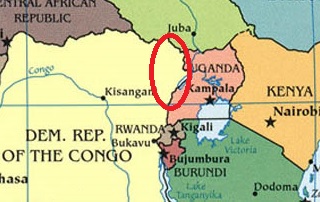| The Allied Democratic Forces (ADF) is a rebel army created in 1995 and is located in the mountainous Democratic Republic of Congo-Uganda border area. It was established as a rebel group intially fighting to overthrow the Ugandan government. Over time the rebels moved across the border into the northeastern DRC and in 2018 pledged its allegiance to the Islamic State (ISIS) and openly declared its goal to eradicate Christianity and establish Islamic law in the region. |
According to the United Nations Group of Experts on the Democratic Republic of the Congo’s (“GoE”) 2013 final report, citing Ugandan officials and UN sources, in 2013 the ADF had an estimated strength of 1,200 to 1,500 armed fighters located in north-east Beni Territory of North Kivu province, close to the border with Uganda (see map below). These same sources estimate ADF’s total membership —including women and children— to be between 1,600 and 2,500.
While the ADF’s ideology has historically contained some Salafi-jihadist elements, it has also recruited along secular ethnic lines and is deeply entrenched in the broader political and economic dynamics of the Rwenzori border region between Uganda and the DRC.
 In 2019, the Islamic State claimed responsibility for an ADF attack and first referenced a “Central Africa Province.” Since that time, ADF militants have regularly emerged from their jungle hideouts to attack and kill Christians. The ADF has recruited and used child soldiers in violation of applicable international law and its proven adaptability and resiliency likely signify a continued and potentially increasing threat to civilians, security forces, and UN peacekeepers.
In 2019, the Islamic State claimed responsibility for an ADF attack and first referenced a “Central Africa Province.” Since that time, ADF militants have regularly emerged from their jungle hideouts to attack and kill Christians. The ADF has recruited and used child soldiers in violation of applicable international law and its proven adaptability and resiliency likely signify a continued and potentially increasing threat to civilians, security forces, and UN peacekeepers.
The ADF has released increasing amounts of propaganda that reflects their ideological alignment with the Islamic State. This includes an increased focus on efforts to kill Christian and other non-Muslim civilians. Additionally, the Islamic State’s propaganda apparatus has released multiple videos showing life inside ADF camps, including celebrations of Eid al-Adha (the Feast of Sacrifice) in reference to the biblical Abraham. Within ADF camps, the organization enforces its own interpretation of Sharia Law and also runs an Islamic banking system into which members are obligated to deposit their money.
Musa Seka Baluku was an Imam at Malakaz mosque in Kampala before meeting Jamil Mukulu, the former leader of the ADF, who inaugurated him into the armed group. Mukulu appointed Baluku to several positions, including serving as the group’s Islamic Judge who handed punishments to those who violated the militant’s interpretation of the Sharia Law. After Baluku became ADF commander, he appointed himself Sheikh and in 2020 he claimed that the ADF had ceased to exist and was succeeded by the Islamic State's Central Africa Province.
In April 2024, a joint operation between the armies of the DRC and Uganda enabled the neutralization of two ADF leaders, the one nicknamed Doctor “Musa”, and the other Commander “Baghdad”. However, this armed group has continued their operations all along 2024 and killed 11 civilians in mid-May and more than 80 civilians in June. 17 more were reported dead in North Kivu province in the Democratic Republic of Congo (DRC) by the end of July. Some of the victims were decapitated with machetes and others were crucified.
Comments powered by CComment